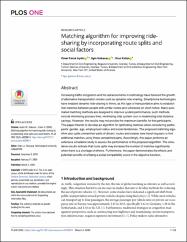Matching algorithm for improving ride-sharing by incorporating route splits and social factors
Özet
Increasing traffic congestion and the advancements in technology have fostered the growth of alternative transportation modes such as dynamic ride-sharing. Smartphone technologies have enabled dynamic ride-sharing to thrive, as this type of transportation aims to establish ride matches between people with similar routes and schedules on short notice. Many automated matching methods are designed to improve system performance; such methods include minimizing process time, minimizing total system cost or maximizing total distance savings. However, the results may not provide the maximum benefits for the participants. This paper intends to develop an algorithm for optimizing matches when considering participants' gender, age, employment status and social tendencies. The proposed matching algorithm also splits unmatched parts of drivers' routes and creates new travel requests to find additional matches using these unmatched parts. Accordingly, this paper performs an extensive simulation study to assess the performance of the proposed algorithm. The simulation results indicate that route splits may increase the number of matches significantly when there is a shortage of drivers. Furthermore, the paper demonstrates the effects and potential benefits of utilizing a social compatibility score in the objective function.

















